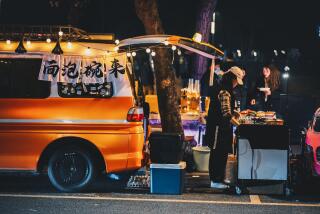Official Secrecy Has Long Shelf Life at Beijing Market for the Privileged : China: Only ‘leading comrades’ can shop at No. 32 Donganmen Street. But just who are they?
- Share via
BEIJING — Privilege in China is rarely ostentatious, and the store at No. 32 Donganmen Street is no exception.
The facade is ordinary brown stone, with a narrow entry for cars. The window shades are down, and further protected by heavy iron grilles. There is no sign.
Inside, however, may be the only food store in China with more salesclerks than customers.
Around the corner on Wangfujing Street, thousands of shoppers jostled their way to counters on a recent afternoon to buy food for Saturday’s Lunar New Year, but the store at No. 32 was nearly deserted.
Four clerks stood idle behind a glass counter displaying China’s best-brand cigarettes, liquor, candy and canned food. Two more women sat in the cashier’s booth, and four other workers stood nearby.
Two men lugging a large crate of eggs out to a truck were the only customers. Across the courtyard, another room housed freezers of meat and fish, also with no buyers.
“Our store is not for the residents,” said deputy manager Qin Jie. “Not everyone can come in--only those approved by the higher authorities.”
The store, run by the Beijing City Food Supply Center, a wholesale food distributor, is part of China’s little-publicized, decades-old network of special privileges for top-level officials and their families.
Qin would not say just who can shop at the store, which opened in 1955. The exchange went like this:
“A few leading comrades can come,” he said.
“Who?” he was asked.
“A few. The scope is set by the higher authorities,” he said.
“Can the president?”
“Yes,” Qin replied.
“The premier?”
“Yes,” he said.
“A Cabinet minister?” he was asked.
“Not necessarily,” Qin said.
“Less than 10 people?”
“Several dozen.” he said.
“How many dozen?”
“A few,” Qin answered.
A recent article in the Hong Kong-based China Market magazine said the store originally supplied only the state chairman, premier and president and their deputies, and the chairmen and deputies of the legislature and Chinese People’s Political Consultative Conference, a high-level advisory body.
But after these officials retired or died, their relatives continued using the store, the magazine said, and their successors expanded the customer list.
In August, 1989, as part of a package of measures intended to blunt popular resentment of official privilege, the government said it was ending special supplies of rationed foods to top officials. Qin said leaders had been allowed to buy extra cooking oil, meat, sugar and eggs at subsidized prices.
Ordinary Chinese were limited to rations, or in recent years could buy extra supplies only on the high-priced free market.
But the government did not shut down No. 32, which still offers the rare privilege of convenient shopping.
“We stock many things so you can buy all in one stop,” said Qin. He said the store offers a wider selection and a generally higher quality of meat and fish than most markets, at slightly higher prices.
But a comparison found some items were cheaper: ham, for example, went for less than 85 cents a pound, compared to $1.05 at a regular store. Maotai, China’s famous fiery liquor, sold for $18, compared to $19.50 at the ordinary shop.
Qin said there is no contradiction in a socialist society offering special stores for special people. “It’s convenient,” he said with some exasperation. “China is a developing country, and its foodstuffs are not so ample.”
He noted that ordinary citizens are supposed to buy their monthly rations of state-subsidized meat, eggs and rice at assigned stores, and he said the concept is similar. “No store could supply all of society,” he added.
Annual sales to leading officials have been no more than $213,000, out of the Beijing City Food Supply Center’s total sales of about $17 million, Qin said.
The center’s main customers are hotels and two small stores for visiting overseas Chinese and foreigners--who, like officials, often have special status in China. These places buy wholesale from a large, well-marked building across the street from No. 32.
Neither building is a place to meet top officials.
“As far as I know, they don’t come themselves. Usually, it’s household servants who come. We’ve never encountered the wife or relative of a (Communist Party) Central Committee member,” Qin said.
“When you come here, it’s like walking into any department store,” added Li Peiji, assistant managing director. “We don’t ask a customer’s status.”
That task falls to three employees who stand near the entrance. Qin said they ask customers to show a card indicating authorization to shop there.
But three men who walked in for cigarettes shortly before the 5 p.m. closing time said no one asked them for identification.
“I’ve been here a few times,” said one, wearing the uniform of a navy commander. “They have a wide variety of goods, and the service isn’t bad.”
Asked if they were related to any high-ranking officials, the three just laughed.
Qin was unperturbed by the apparent breach of exclusivity.
“Maybe, when he came before he was with someone who had identification,” he said of the navy commander. “We welcome the expansion of our service.”
More to Read
Sign up for Essential California
The most important California stories and recommendations in your inbox every morning.
You may occasionally receive promotional content from the Los Angeles Times.










